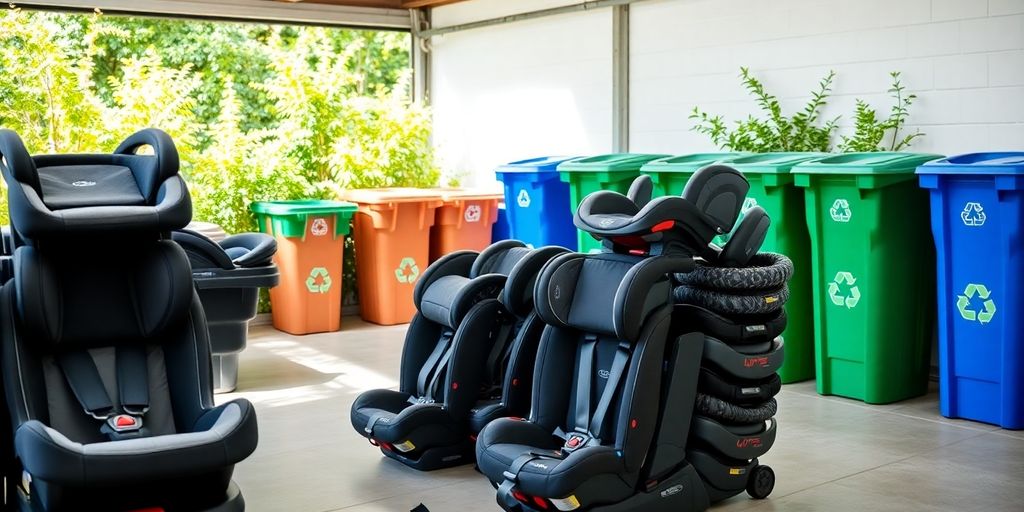If you have an old car seat taking up space, you might wonder what to do with it. Recycling car seats is important for both safety and the environment. This guide will help you understand why recycling is essential, how to find local programs, and what steps to take to recycle your car seat properly. Let’s dive into the world of car seat recycling and discover how you can make a difference!
- Who Buys Cars Near Me? Discover Local Buyers for Your Vehicle
- Your Guide on Where to Return Verizon Fios Equipment Near Me
- Discovering Tasty Food Near Me: A Culinary Adventure in Sacramento
- Discover the Best Vegan Restaurant Near Me: A Culinary Adventure Awaits!
- Discovering the Best Goan Thali Near Me: A Culinary Journey Through Flavorful Delights
Key Takeaways
- Recycling car seats helps reduce waste and protects the environment.
- Check local resources for recycling programs or events.
- Some manufacturers and retailers offer take-back and trade-in options.
- Make sure to prepare your car seat properly before recycling.
- If local options are limited, consider mail-in programs or DIY dismantling.
Understanding the Importance of Car Seat Recycling
Car seat recycling is crucial for both safety and the environment. Recycling helps reduce waste and ensures that old car seats don’t end up in landfills. Here’s why it matters:
You are viewing: Discover Where to Recycle Car Seats Near Me: A Comprehensive Guide
Why Recycling Car Seats Matters
- Safety First: Expired car seats may not protect your child in an accident. Recycling ensures these outdated products are removed from circulation.
- Resource Conservation: Recycling car seats allows materials to be reused, which helps conserve resources and reduces the need for new materials.
- Community Awareness: Promoting recycling can encourage others to think about their waste and make responsible choices.
Environmental Impact of Car Seat Disposal
When car seats are thrown away, they contribute to landfill waste. Here’s a quick look at the impact:
| Impact Type | Description |
|---|---|
| Landfill Waste | Car seats take years to decompose. |
| Resource Waste | Valuable materials are lost when not recycled. |
| Pollution | Decomposing materials can release harmful substances into the environment. |


Safety Concerns with Expired Car Seats
Using an expired car seat can be dangerous. Here are some key points:
- Degraded Materials: Over time, the materials in car seats can weaken, making them less effective in a crash.
- Outdated Standards: Safety regulations change, and older seats may not meet current safety standards.
- Increased Risk: Using an unsafe car seat increases the risk of injury in an accident.
Recycling car seats is not just about decluttering; it’s about ensuring safety and protecting our planet. By recycling, you contribute to a healthier environment and a safer future for children.
How to Identify Local Car Seat Recycling Programs
Finding a place to recycle your car seat can be easier than you think. Here are some steps to help you locate local recycling programs:
Checking with Local Waste Management Services
Start by contacting your local waste management services. Many cities have specific car seat recycling programs that accept old car seats. You can usually find this information on your city’s official website or by calling their office. They may also have special events for recycling bulky items like car seats.
Exploring Community Recycling Events
Keep an eye out for community recycling events. These events often provide a great opportunity to recycle your car seat safely. Check local community boards, social media, or neighborhood groups for announcements about upcoming events. Participating in these events not only helps you recycle but also connects you with others in your community.
Utilizing Online Resources for Local Programs
The internet is a valuable tool for finding recycling options. Use search terms like "car seat recycling near me" to discover local programs. Websites like Earth911 can help you find nearby recycling centers. Additionally, consider checking with local parenting groups online; they often share information about recycling initiatives.
By taking these steps, you can ensure that your old car seat is disposed of responsibly, contributing to a cleaner environment.
Summary of Steps to Identify Local Programs:
- Contact local waste management services for information on recycling programs.
- Look for community recycling events through local boards or social media.
- Search online for resources that list nearby recycling options.
By following these steps, you can easily find a suitable place to recycle your car seat, ensuring it is handled properly and safely.
Manufacturer and Retailer Recycling Initiatives
Manufacturer Take-Back Programs
Many car seat manufacturers have recycling programs to help you dispose of old car seats responsibly. Here are some steps to follow:
- Check the Manufacturer’s Website: Visit the website of your car seat brand to see if they offer a take-back program.
- Contact Customer Service: If you can’t find information online, call their customer service for details.
- Shipping Options: Some companies provide pre-paid shipping labels, making it easy to send back your old car seat.
Retailer Trade-In Events
Read More : Discover the Top Pan Asian Restaurants Near Me for a Culinary Adventure
Major retailers like Target and Walmart often run car seat trade-in events. Here’s what you need to know:
- Discounts and Incentives: You may receive a discount or gift card for turning in your old car seat.
- Timing: These events usually happen during Earth Month or in the fall, so keep an eye out for announcements.
- Check Local Stores: Visit your local store or their website for specific details, as terms can vary.
Special Promotions and Discounts
Some manufacturers and retailers offer special promotions to encourage recycling. Here are a few examples:
- Discounts on New Purchases: Get a discount on a new car seat when you recycle your old one.
- Limited-Time Offers: Look for seasonal promotions that may include recycling incentives.
- Community Programs: Participate in local initiatives that may offer additional benefits for recycling.
Recycling car seats not only helps the environment but also supports community programs. Every little bit counts!
Preparing Your Car Seat for Recycling
Before you recycle your car seat, it’s important to prepare it properly. This ensures that the materials are handled correctly and can be reused effectively. Here’s how to do it:
1. Checking Expiration Dates and Condition
- Inspect your car seat for any expiration dates. Most car seats have a label indicating when they should no longer be used.
- Look for any damage or missing parts. If the seat is damaged, it may not be suitable for recycling.
- If your car seat is expired or damaged, it’s time to recycle it.
2. Disassembling the Car Seat
- Start by removing the fabric cover, harnesses, and padding. This helps separate the different materials.
- Some recycling programs require you to separate plastic and metal parts, so check the guidelines.
- Follow the manufacturer’s instructions for dismantling to avoid damaging reusable parts.
3. Cleaning and Labeling Components
- Clean the plastic parts to remove any dirt or debris. This helps ensure they are ready for recycling.
- If required, label the car seat with "EXPIRED – DO NOT USE" to prevent accidental reuse.
Properly preparing your car seat for recycling is crucial. It not only helps in keeping kids safe but also contributes to environmental sustainability.
By following these steps, you can ensure that your car seat is recycled responsibly, helping to keep harmful materials out of landfills and promoting a safer environment.
Alternative Recycling Options When Local Programs Are Unavailable
Mail-In Recycling Programs
If you can’t find a local recycling option, mail-in recycling programs can be a great choice. Organizations like TerraCycle offer services where you can send your car seat directly to them. They provide instructions on how to prepare your seat for shipping, making it easy to recycle from home.
DIY Dismantling and Recycling
Another option is to dismantle your car seat yourself. Here’s how you can do it:
- Remove the fabric cover and foam padding.
- Take out any metal parts.
- Separate the plastic components.
This way, you can recycle each part according to your local recycling guidelines.
Non-Profit Organization Initiatives
Some non-profits focus on recycling car seats. They may accept them for reuse or recycling. Look for local organizations that might take your old car seat and give it a new life. This can be a great way to help your community while ensuring your car seat is disposed of responsibly.
Remember, recycling is not just about getting rid of old items; it’s about making a positive impact on the environment. Every little bit helps!
Common Challenges and Solutions in Car Seat Recycling
Recycling car seats can be tricky, but understanding the common challenges can help you find solutions. Here are some key issues and how to tackle them:
Accessibility of Recycling Locations
Read More : Discover Which McDonald’s Accept EBT Near Me: A Guide to Fast Food Options
Many people struggle to find nearby recycling centers that accept car seats. Limited locations can make it hard to recycle them properly. To overcome this, consider:
- Mail-in services offered by companies that specialize in recycling.
- Checking with local waste management for any special events.
- Using online resources to find nearby options.
Handling Mixed Materials
Car seats are made from various materials, including plastic, metal, and fabric. This can complicate recycling. Here are some tips:
- Separate materials before recycling, as some centers require this.
- Verify local guidelines to know what can be recycled.
- Use online directories to find specific recycling instructions.
Understanding Recycling Requirements
Different programs have unique rules. Some may ask you to remove foam or cut harnesses. To ensure you follow the rules:
- Always check the guidelines of the recycling program you choose.
- Prepare your car seat by disassembling it as needed.
- Label components if required, to avoid confusion.
Recycling car seats is essential for both safety and the environment. By being aware of these challenges and solutions, you can make a positive impact.
By addressing these common challenges, you can successfully recycle your car seat and contribute to a healthier planet. Remember, finding the right recycling option is key to ensuring that your old car seat is disposed of responsibly.
Final Thoughts on Car Seat Recycling
Recycling your old car seat is a smart choice for both your home and the planet. By taking the time to find the right recycling options, you help keep harmful materials out of landfills and support a cleaner environment. Remember, it’s important to check if your car seat is expired and to look for local programs or events that can help you recycle it properly. Whether you choose to use manufacturer take-back programs, participate in trade-in events, or find a nearby recycling center, every effort counts. So, don’t let that old car seat take up space—turn it into a positive action for our world!
Frequently Asked Questions
Why is it important to recycle car seats?
Recycling car seats is important because it helps reduce waste in landfills and ensures that old seats, which may not be safe anymore, are disposed of properly. It also helps repurpose materials for new products.
How can I find local car seat recycling programs?
You can find local car seat recycling programs by checking with your city’s waste management services, looking for community recycling events, or searching online for resources in your area.
What should I do if my car seat is expired?
If your car seat is expired, it’s best to recycle it instead of donating or selling it. Expired seats may not meet safety standards and can be dangerous.
Are there any trade-in programs for car seats?
Yes, many retailers, like Target and Walmart, often have trade-in events where you can exchange an old car seat for a discount on a new one. Keep an eye out for these events.
How do I prepare my car seat for recycling?
To prepare your car seat for recycling, check its expiration date, disassemble it by removing fabric and harnesses, and clean the components. Make sure to label it as expired.
What if there are no recycling programs near me?
If there are no recycling programs nearby, consider using mail-in recycling services or dismantling the car seat yourself to recycle its parts separately.
Soure: https://herego.net
Category: near me


